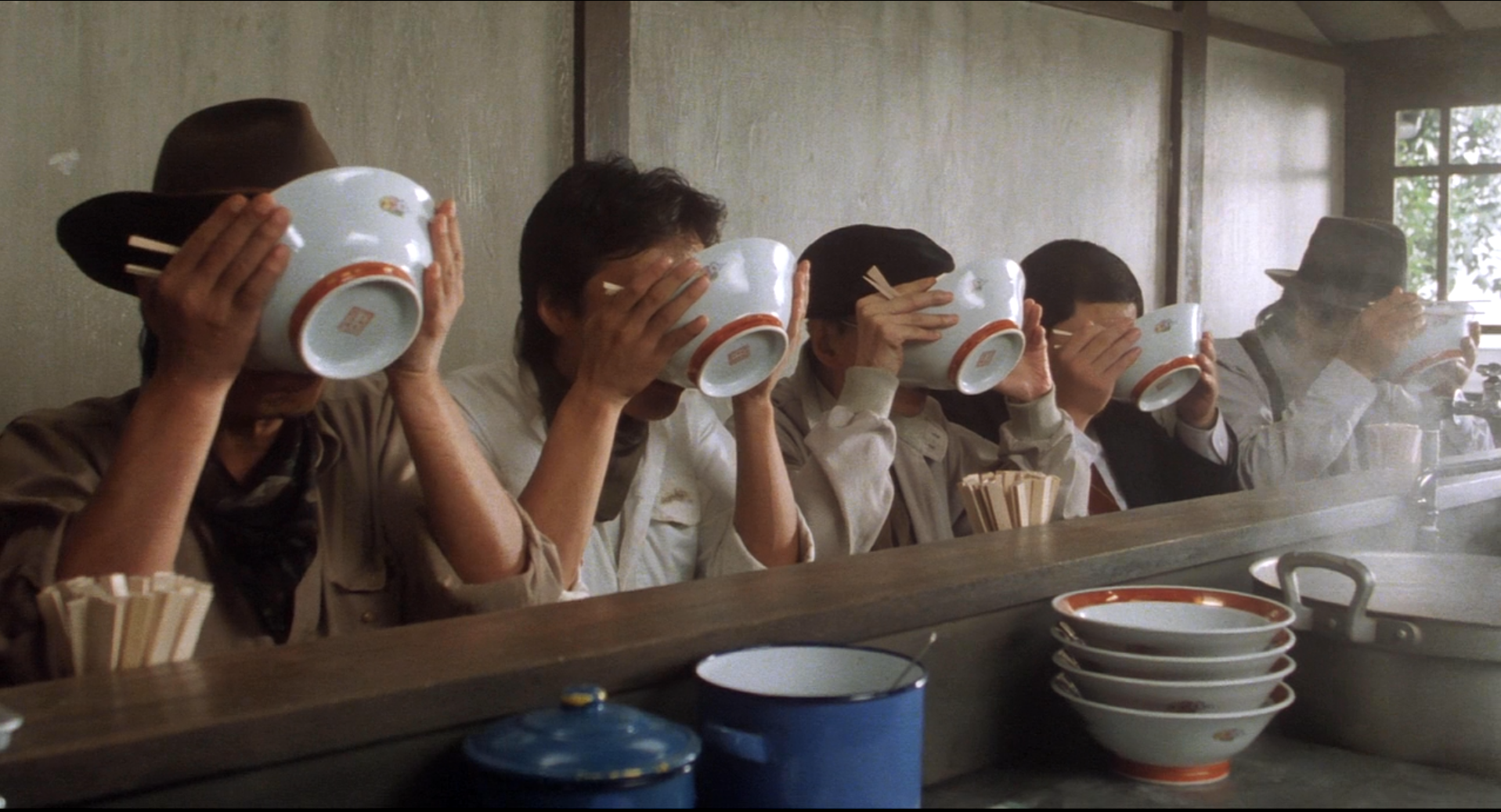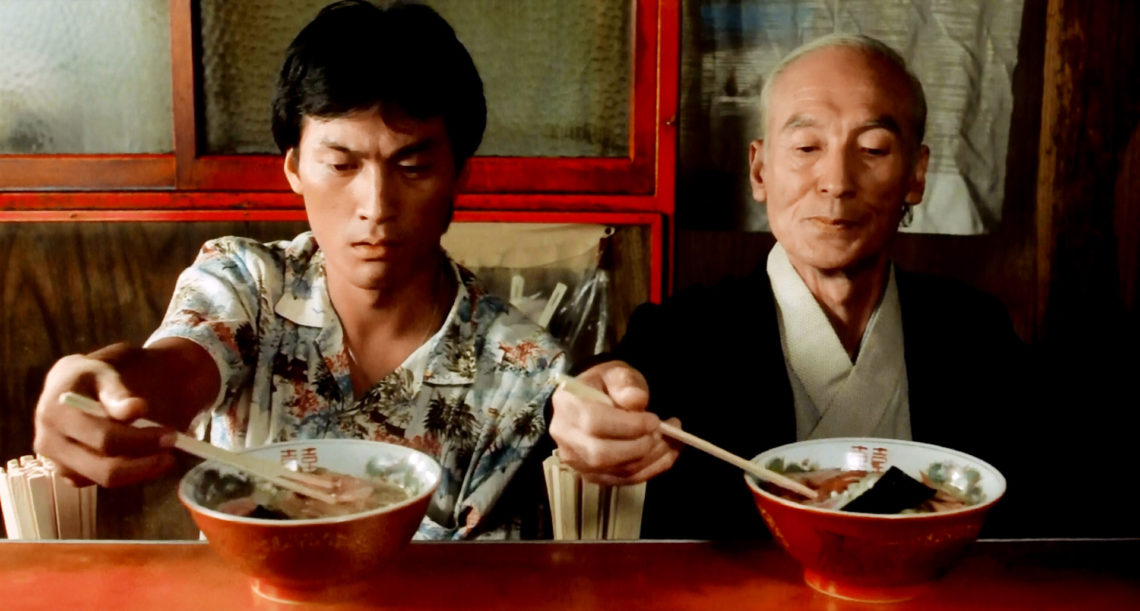“People who love to eat are always the best people.” — Julia Child
When it comes to viewing experiences, the specifics of time and place directly influence one’s thoughts and feelings about a work of art. Such thoughts and feelings are inextricably tied to and shaped by my physical reality—most of all, by where I am on the scale of tiredness and satiety.
The fact that I can remember very little about the exact physical circumstances under which Tampopo (1985) came into my life—whether it was a gift bestowed one late afternoon in my world cinema history class or on a bleary-eyed morning in an East Asian film class—is not just evidence of a slipping memory that’s been overloaded by thousands of other cinematic experience in the intervening years. It is that Tampopo, with its many ecstatic images of food, is perhaps one of those films that is so visceral and celebratory, so uniquely mimetic that the temporal reality in which I experienced the film has been usurped by the film itself. I do not remember the textures of the seat that I may have sat on or whether I had eaten breakfast that day, but I do remember the smell of ramen, the chewy texture of it, the heat of the broth making my nose water, and the pure joy of giving oneself over to the simple pleasure of food.
Juzo Itami spent the majority of his working life as an actor—appearing in films by Kon Ichikawa and Nagisa Oshima, the influence of the latter especially apparent on Tampopo—before turning to directing in his fifties, with Tampopo (1985) following his directorial debut, The Funeral (1984). In Tampopo the eponymous heroine (Itami’s wife Nobuko Miyamoto, whom he cast in all of his 10 films) is a widow with a young son struggling to run a dingy hole-in-the-wall ramen joint. Late one night two truck drivers, the cowboy hat clad Goro (Tsutomu Yamazaki) and Gun (a young Ken Watanabe in one of his first roles), stop by the restaurant after being made ravenous by a story that Gun is reading in which a ramen guru tries to initiate a young man into the art of eating ramen (“Now with the tips of your chopsticks smooth out the surface and caress the ramen”).
Goro makes it clear that Tampopo’s ramen is not up to snuff and she begs him to take her on as his apprentice and train her in the ways of ramen-making. He agrees to do so, putting Tampopo through a rigorous training process and assembling a team of multiple advisors to help Tampopo create the perfect recipe for ramen. They spy on the ramen shops of their competitors, steal recipes for broth, taste their way through mountains of noodles, and inch their way to the perfect ramen recipe. What is interesting about Itami’s chosen pursuit of ramen rather than, say, the recipe for the perfect turtle soup (though there is a scene in which turtle soup is consumed) is that ramen transcends class. From the homeless food savants to the working class to the obscenely wealthy, all are shown to have an essential appreciation for and devotion to it.

From its first scene onward Tampopo nods to and kisses cine-history. It breaks the fourth wall and offers a mish-mash of genre archetypes (the gangster, the cowboy), editing choices (dissolves, irises), and ebullient transitions between the main narrative and the irreverent episodic asides which all involve some sort of encounter with food. There’s a woman at a restaurant who tries to teach a group of girls the proper etiquette for eating spaghetti, only to be derailed by a man at a nearby table loudly slurping up and indulging in his noodles. Elsewhere, a child eats his first ice cream. A mother gets up off her deathbed to prepare one last meal for her family. A young woman has an oyster eaten out of her hand by an unnamed gangster (Koji Yakusho) in a white suit—who is featured in multiple side narratives—and experiences a sexual awakening. And et cetera.
Itami equates food with life, love, and sensuality. In one of the four disruptions from the narrative, featuring the white-suited Yakusho and his girlfriend (Fukumi Kuroda), Itami directly references the scene in Nagisa Oshima’s In the Realm of the Senses in which a hardboiled egg spends some time marinating in Eiko Matsuda’s vagina before being consumed by her partner. Itami’s take on the relationship between sex and food is less provocation, more comedy. Yakusho and Kuroda crack a fresh egg and proceed to transfer the egg yolk between their mouths until eventually it orgasmically bursts in Kuroda’s. But the comedy does not attenuate the power of the idea, in fact, the warmth of this scene bolsters its potency—sex and food are fun. Indulgence is good.
There are many films that are set in kitchens and restaurants that are absolutely miserly with their images of food, treating food as a distraction from the heart of the narrative (which tends to be the genius struggle of the chef). At the end of it those of us who were hungry for cinematic images of food are left feeling deprived and cheated, wondering why the camera couldn’t have lingered just a moment longer on the simmering boullion instead of giving us another close-up of the bedevilled chef. But Itami does not like hunger. This is a film that celebrates food as much as it does cinema. It is abundant with images of food, of cooking, of eating. It is a work from which you walk away feeling sated.

















